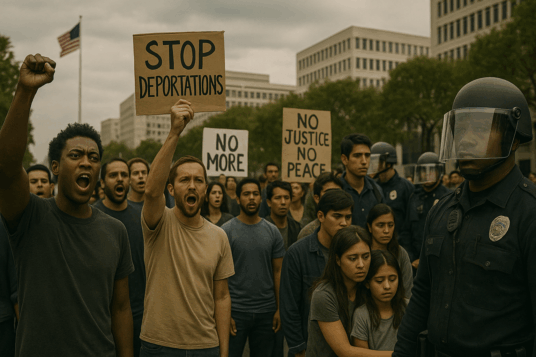For many in immigrant communities—especially those undocumented or with loved ones at risk—the thought of deportation is more than legal paperwork. It’s the threat of separation, shame, and survival. They may have come here out of desperation, or with dreams of a better life, or simply following someone they trusted. Whatever the case, when immigration enforcement sweeps through neighborhoods or families, it doesn’t feel like justice. It feels like judgment. And for some, it feels like war.
For their allies—people who sympathize with the cause, or who believe the nation should show more mercy—the urge to rise, to protest, to stop what feels like cruelty is strong. That urge may begin in compassion. But sometimes it spills into outrage, and that outrage spills into the streets in dangerous ways. What starts as protest becomes riot. And then the headlines no longer speak of suffering, but of chaos.
On the other side are those who watch these protests and riots with disgust. They see a nation unraveling. They see disrespect for law and a breakdown of order. And they cry out for strength. For someone to restore control. For the law to be obeyed and for the government to act decisively.
But here is where we must pause.
We are not animals ruled by instinct or mobs driven by emotion. We are people made in the image of God. And in a time of confusion, it is not more rage or more fear that we need—but more wisdom. More truth. And more courage to walk the narrow path between the extremes.
The Church and the Law: Not Enemies, Not Equals
Scripture gives us a clear and sober command in Romans 13: “Let every person be subject to the governing authorities. For there is no authority except from God.” The government bears the sword for a reason—to preserve peace and restrain evil.
That means enforcement of immigration law is not, in itself, immoral. It may be painful. It may feel harsh. But enforcing the law is not the same as injustice.
Yet Romans 13 is not a blank check. The government’s power is not unlimited. It must rule justly. It must carry out law with proportionality and restraint. We are not called to bow to tyranny—but neither are we called to defy legitimate authority every time it makes us uncomfortable.
So How Should We Respond?
First, with compassion. Whether or not someone is here lawfully, we must remember their humanity. They are not statistics. They are souls. They are image-bearers. This does not remove consequences. But it does demand dignity. Enforcement without compassion becomes cruelty.
Second, with clarity. We must not call good evil, or evil good. Rioting is not protest. Violence is not justice. And civil unrest is not righteousness. If our response to hardship is lawlessness, we are not seeking justice—we are demanding power.
Third, with responsibility. The church—meaning believers, not institutions—must be both gentle and firm. Gentle with people. Firm with truth. We must be a refuge for the fearful, a conscience to the powerful, and a people who do not panic when the world rages.
But we must also tell the truth: being undocumented does not mean being hopeless. If someone truly longs to make this land their home, there are lawful and honorable paths. It will not be easy. It may require patience, sacrifice, or even starting again. But help does exist—through legal aid, faith-based ministries, and advocacy groups committed to due process and justice. If the laws seem unfair, there is still the vote, the court, and peaceful petition. To resist law altogether is not courage—it is chaos.
America is not a land that rejects immigrants. It rejects lawbreakers. There is a difference, and it matters.
A Final Word
We will see this again. If not over immigration, then over something else. There will be more protests. More cries of injustice. More calls for power. In those moments, I pray we remember:
- That the law is a gift when wielded rightly.
- That justice without mercy is hollow.
- That mercy without truth is naïve.
- And that the Christian must never pick sides with the world, but must walk the path of Christ.
The way of Christ is not passive. But it is never anarchic. He stood before both Caesar and Pilate, knowing full well their authority. Yet He also wept with those who weep, dined with the lowly, and welcomed the stranger—without compromising truth or righteousness.
That is our task.
To love the people.
To honor the law.
And to speak the truth—when the streets burn, when the crowds cry, and when the soul of a nation is at stake.
